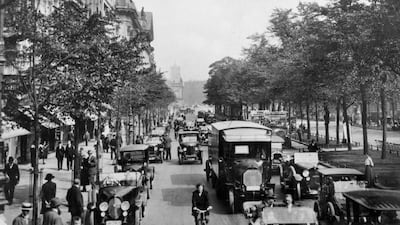The year 1929 saw the publication of three uniquely brilliant novels by three very different German-speaking writers. All have endured. Erich Maria Remarque's All Quiet on the Western Front illuminates the carnage and futility of the First World War from the German perspective.
In contrast, Grand Hotel by Austrian-born Vicki Baum is a sparkling yet searching study of Berlin polite society in the golden twenties.
The other great novel that year was set in Weimar Berlin during the less stable end of the decade, and with unsparing detail insight examined the flipside to Baum's world. Alfred Döblin's Berlin Alexanderplatz charts the wrong moves, second chances and squandered opportunities of a recidivist criminal as he forges his way through the capital's underbelly in search of light.
Döblin (1878-1957) moved to Berlin at the age of 10 and remained there until the Nazis came to power. His knowledge of the city – his awareness of its sights and sounds, people and places, highs and lows – is evident on every page of the book he is best known for.
This new English translation by Michael Hofmann – the first in more than 75 years – replaces stodgier versions by expertly capturing the fecundity, originality and musicality of Döblin's masterpiece.
Locked away for four years for doing “some stupid stuff” – or beating up his girlfriend Ida so badly that she died – Franz Biberkopf now vows to keep on the straight and narrow. He is released from prison and finds himself back on the streets of Berlin, dislocated and alone. “His real punishment,” we are told, “was just beginning.”
Gradually, Biberkopf makes progress, and for a while it seems he is able to settle down and make an honest man of himself. He gets jobs hawking tie-pins, newspapers and shoelaces, and strolls around town with new girlfriend Lina on his arm.
But these weeks spent being “decent” turn out to be a mere period of respite. He falls in with a bad crowd and, at first unwittingly and later willingly, becomes involved in shady deals and audacious burglaries. He is double-crossed, run over and hung out to dry; he loses an arm and, for a time, his mind. When he picks himself up and dusts himself down he is stronger and ready to take on villainous rival Reinhold.
However, fate has other ideas. Biberkopf's beloved Mitzi is murdered, sending him over the edge and down to rock bottom. Soon, he is on the run for a crime he didn't commit and prepared to end it all – that is until a conversion in custody and re-immersion in the city offers the faint yet possible prospect of redemption.
Berlin Alexanderplatz is a bold and dazzling collage of a novel. Blended into or built around Biberkopf's misadventures are newspaper articles, weather reports, Biblical stories, Jewish yarns, ancient myths, street noise and thick streams of consciousness. Its urban exploration, together with its bravura range of styles and voices and narrative tricks, have led to a comparison with that other modernist-metropolitan epic, James Joyce's Ulysses, a book Döblin admired. While this is valid to a point, Döblin's book is a quite different beast: more visceral than cerebral, more plot-driven, and with more at stake for its desperate characters.
Those characters consist of thieves and fences, killers and victims, misfits and thugs. All elements of the underworld are present and correct. Flitting around them at key junctures are token policemen, political adversaries and bitter and broken war veterans ("We give our blood for the Fatherland against the Poles and Frogs and this is how the nation thanks us"). As we head into the realm of madness and hallucination, we encounter angels and dead souls.
Döblin’s main character steers the novel but also plays with our emotions. We champion Biberkopf, hoping he will stay clean and sane through hard times. But then Döblin will remind us of what he looks like (“a coarse, rough man of repulsive appearance”) or his refusal to accept responsibility for his crime (“It could happen to anyone, they lose their temper, their hand slips”) and he stops being a lovable rogue.
____________________
Read more:
Book review: 'Hotel Silence' is one person’s attempt to understand their existence
Book review: Finely crafted characters and curiosities define Jim Crace’s 'The Melody'
Book review: Turning for Home by Barney Norris filled with tender and plangent observation
____________________
When Biberkopf decides that crime pays (“Working gives you calluses, but not money”) and starts to live off “immoral earnings” he loses our sympathy. However, he remains an electrifying presence on the page, a reckless, self-destructive force of nature impossible to ignore. Döblin transfixes us with two other features. The first is his roving, scoping, catch-all narration, similar to John Dos Passos’ “Camera Eye”. He takes us down streets, around landmarks, and into apartments, bars, shops, ballrooms, a mental asylum, police headquarters, and, in a scene that could turn the staunchest meat-eater into a vegetarian, a slaughter house.
The second compelling aspect is the novel’s rich speech patterns. Hofmann transforms the vernacular of Berlin lowlife into a kind of battered Cockney slang. People are on the lam or in chokey, they say innit, dunno and nuffink, and it works wonders. When the characters don’t speak, their creator does, either admonishing Biberkopf or addressing the reader in a chatty, gossipy way.
The novel doesn’t always make for comfortable reading, but it is hard not to be charged by its raw energy, carried along by its manic rhythms, or gripped by its supremely inventive depiction of a man “going to hell with a great fanfare.”

